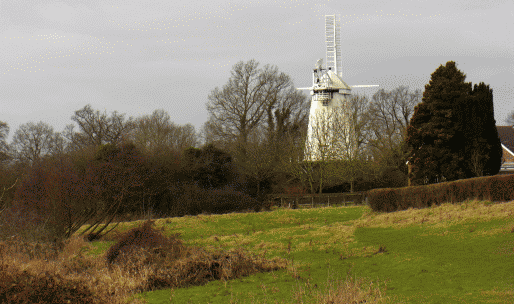''We look for some fun when Mr Belloc and Mr Chesterton get together, and their latest collaboration may send us back to the "EmanueI Burden" of something over twenty years ago. Indeed, in Mr Chesterton's admirable illustrations the contours of Mr Petre recall sometimes the earlier protagonist. Of course Mr Belloc and Mr Chesterton are serious persons, and their fun is at bottom, as Matthew Arnold might say, a criticism of life. It is not life, but there is some analogy with it in this exposure of human folly and credulity. It appears that we shall not be wiser a generation hence than we are now.
The story begins in 1953 with the return of Mr Peter Blagden from New York, and for a page or two the irony seems to be held in reserve; we have time to think that Mr Belloc could, if he would, give us a very interesting "ordinary" novel. But Mr Blagden loses his memory completely, and from no particular cause; chances combine to identify him with Mr Petre, the great American millionaire. So he becomes involved in enormous transactions, and on the strength of an occasional "Exactly" or "I quite understand" his reputation as the most astute man of his time becomes assured. He puts up at the Splendide (or, as the proof-reader leaves it on one occasion the Savoy), and so courted is he that he must bolt to the country sometimes for breathing space.
If he buys everybody follows, and his chance expression of opinion breaks up a luncheon party, everybody rushing for the telephone. Perhaps the loss of memory is a little arbitrary in its working, but it is a good device for the display of Mr Belloc's scornful irony. For, of course, everything that Mr Petre says and does is idiotic. A man reputed to have fifty million pounds must be a master-mind, and financiers feel that they must crawl before him or be ruined.
It is a mad world, an abominable but comical world in which the knaves are also fools. Tremendous transactions are entered upon, and though Mr Belloc disclaims the technical equipment of the economist, one is convinced that he would make a good City Editor. Probably, though, the City would be treated as an Augean stable. The financiers appear as rogues that no sane person can take seriously. Mr Petre piles up millions and doesn't know what to do with them; he becomes quite bitter about it. His memory returns and the real John Petre turns up.
Finance has had its trouncing and now comes law. Our law is as absurd as our finance. The unfortunate American, consumed with indignation and determined to punish the impostor, is baffled by it. Naturally the case got to the House of Lords, and the final judgement was delivered by Ermyntrude, Viscountess Boole, the Lord Chancellor. Mr Peter Blagden is left considering what disposal of the money will do the least harm.
Mr Chesterton's drawings are capital, and indicate a precise appreciation of his friend's ironies.''
The Manchester Guardian, 05 June 1925


No comments:
Post a Comment